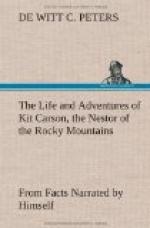At one time, the Indians succeeded in making the Mexicans converts to the belief in the existence of these mines, as they showed them specimens of gold which they affirmed to have been taken from them. It was agreed that, for this valuable information, presents, such as blankets, horses, and guns, should be made to those Indians who had openly proclaimed the good news, provided they could conduct the Mexicans to them. A party was formed and started to explore the valley, but, as nothing was afterwards heard of their success, and, as many of them, to all external appearances, were as poor as ever when they returned, it is presumed that they were duped by the Indians. The bottom land of the Rio Grande which skirts the southern border of the valley of San Luis, is, judging from the luxuriant hay crops which it produces, year by year, quite a good farming section; and, no doubt, ere long, the Mexicans will there establish a new settlement and thus practically demonstrate the use to which this beautiful valley can be put.
While passing up the valley of San Luis, Colonel Fauntleroy came to the Punchi Pass. This pass is the main opening through the mountains which bound the valley of San Luis on the north. The pass itself is less than half a mile wide, but yet, it presents some of the grandest scenery human eyes ever beheld. The mountains, on either side, are not so lofty as their compeers close by, but they are rugged and picturesque. Through the pass runs a bold stream, which, at about midway (and at this time) was obstructed by a beaver dam, that was so scientifically constructed as immediately to attract the attention of the entire party. Near to this dam, there is a very large hot spring, which is located close under the base of one of the mountain sides, and which, under the favorable circumstance of a fine day, lends enchantment to the view. The Punchi Pass is but a few miles long and leads into a beautiful little valley, called by the Mexicans after the same name which is given to the pass.
On arriving at the Punchi Pass, Col. Fauntleroy proceeded on through it to the head-waters of the Arkansas river, where, fortunately, a fresh trail made by the Indians was found. This trail was followed with such assiduity and prudence that the camp of some spies belonging to the enemy, and which was in their rear, was passed by the Americans one night without their presence being noticed. Early the ensuing morning (before the break of day), the main village of the Indians was discovered. Its occupants were enjoying a war and scalp dance, and their voices, as engaged in the song which usually accompanies such festivities, could be heard for a distance of at least a mile. Unconscious of danger, they were having a merry time. One can imagine, better than can be described, the scene that followed when three hundred loaded rifles poured their contents into this crowd. Suffice it to say, that among those who survived this terrible retribution, the greatest consternation prevailed; but, as a dernier resort, they began to fly, when they were hotly pursued by the soldiers. Before quitting their late camp, some of the savages had managed to get their own rifles, and with them to fire several shots which did some execution, as two soldiers were killed and two wounded.




